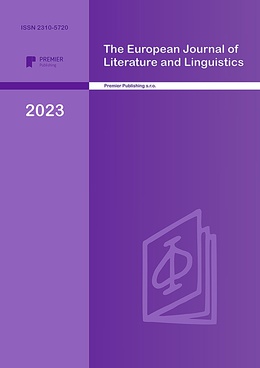LINGUISTIC-DISCRETIVE EXPRESSION OF GRADATION
Authors
Mahmudova Nilufarkhon Ravshanovna

Share
Annotation
Static indicators of gradation are represented by means of different linguistic degrees. They record the level of the gradation associated with the corresponding point on the scale, and thus express specific gradational concepts in the language. The average level or norm of a character usually has no special means of determination. This feature is noted by many researchers. It is worth noting that the indicators of the highlighted groups differ, first of all, in the degree of graduality of the sign, that is, they occupy different points of the scale, increasing and decreasing in relation to the middle point (norm).
Keywords
Authors
Mahmudova Nilufarkhon Ravshanovna

Share
References:
1. Arutyunova N.D. Types of linguistic values: Assessment. Event. Fact. - M.: Nauka, 1988. - 341 p.;
2. Belichenko, E.A. Functional-grammatical variation of lexemes with the meaning of parts of the human body (on the example of nouns and verbs back, hand, head and shoulder): abstract of the thesis of a candidate of philological sciences. – СПб, 1999. – p. 32.
3. Chervenkova I.V. General adverbial indicators of the sign of the sign (in the modern Rusakom Literary Language): Author of the dissertation of the candidate of philological sciences: 10.02.01 / Academy of Sciences of the USSR. Institute of the Russian Language. - M., 1975. - 26 p.
4. Devkin V.D. About the Gradual Dictionary // The phraseological system of the language. - Issue 4. - Chelyabinsk: Chelyabinsk State Pedagogical Institute. -1978.-S. 54-62.;
5. Dybo, A.V. Semantic reconstruction in Altaic etymology. Somatic terms (shoulder girdle). – M.: Gnosis, 1995. – р 385.
6. Gak, V.G. Language transformations. – M.: School. Languages of Russian culture, 1998. – р 768.
7. Efremova, T.F. New dictionary of the Russian language. Explanatory derivational. - M .: Russian language, 2000. - T. 1: A-O. – p 1213.
8. Mahmudov N. Linguistic landscape of the world and word acquisition // Uzbek language and literature. 2015.№3.- p.3
9. Nurmonov A. History of Uzbek linguistics.-Tashkent: Uzbekistan.2002.-p.13
10. Plungyan, V.A. On the description of the African "naive picture of the world" (localization of sensations and understanding in the Dogon language) // Logical analysis of language: Cultural concepts. - M .: Nauka, 1991. - p. 155-160.
11. Personovsky E.A. The zero degree of quality and the description of the value of high -quality adjectives and some combinations with them // Problems of semantics. - M.: Science. -1974.-S. 229-247.
12. Starykh, O.V. Somatism as a special class of words in the lexical system of the Church Slavonic language // Vestnik PSTGU: Philology. - 2011. - No. 2. - p . 80-8. 13. Shahobiddinova Sh. The dialectic of generality and specificity and its reflection in the morphology of the Uzbek language. Abstract of thesis of a candidate of philological sciences -Tashkent, 2001.-p.9
14. Shegal E.I. Gradation in lexical semantics: a training manual for a special course. - Kuibyshev: Kuibyshev State Pedagogical Institute, 1990. - 96 p.
15. Sakhno S.L. Approximate naming in natural language // Issues of Linguistics. -1983.-No. 6.-p. 29-36.
16. Sheagal E.I. Gradation in lexical semantics: a training manual for a special course. - Kuibyshev: Kuibyshev State Pedagogical Institute, 1990. - 96 p.
17. Tulenov J.Gafurov Z. Philosophy.-Tashkent, 1997.- p.182.
18. Vezhbitskaya, A.S. Semantic universals and description of languages. - M .: Languages of Russian culture, 1999. – р 780.
19. Vereshchagin, E.M. Language and culture / E.M. Vereshchagin, V.G. Kostomarov. – M.: Indrik, 2005. – р 1038. ASEAN Journal on Science & Technology for Development Vol 39, No 4, 2022, 3-9 8 DOI: 10.5281/zenodo.6471676
20. Wolf E.M. Functional semantics of assessment. - M.: Nauka, 1985. - 229 p.;


